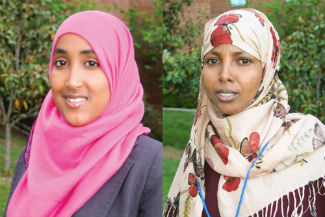Two graduates of the Center for Justice and Peacebuilding at Eastern Mennonite University are finalists for an award honoring women working to resolve water-related conflicts.

The award will be delivered the first day of the first annual Rules of Water, Rules for Life summit on Sept. 27 and 28, 2017, organized by Milan Global and the Milan (Italy) Center for Food Law and Policy.
The conference “promotes a multisectoral and a multidimensional discussion” about “topics such as drinking water supply in rural and in metropolitan areas, energy, food and agriculture, gender and health.”
The award acknowledges women committed to resolving water-related conflicts and seeks to thank a woman working on the ground and promote a female scholar who “dedicates her academic work to providing new rules that could make a contribution in reaching a peace agreement.” Furthermore, the award website says, the prize aims to remember the anniversary of UN Resolution 1325 and “intends to exalt women, their ability and wisdom to build peace, precisely where the possession of a precious and extinguishable resource as water too often triggers the temptation of war.”
The 12-person jury for the award includes people from a variety of fields, including, among others, Elisabetta Belloni, Secretary General at Italian Ministry of Foreign Affairs and International Cooperation; Marta Dassù, President of the International Board at Women Empower the World; Hilal Elver, UN special rapporteur for the right to food; and Michela Miletto, Deputy coordinator of the World Water Assessment Programme (WWAP UNESCO).
Amina Abdulkadir
Abdulkadir is a researcher at Peace and Development Research Centre (PDRC) based in Garowe, Puntland State of Somalia, where her work is focused on the decentralization of power to local authorities and building relationships between local leaders and their communities.
The Somali economy, she said, is based on livestock, farming and fisheries, yet the region has suffered prolonged droughts. For a decade Abdulkadir has been involved in peacebuilding and conflict resolution, mostly with clan or community conflicts based on water and pasturelands.
Abdulkadir said that the WPW recognition is encouraging “for me, for Somali women, and as well for women living in conflict and post conflict countries,” all of whom “wish to reach their dreams with unity and cohesion.”
Nimo Somo
In 2013, Somo noted that in her home county of Wajir, Kenya, land for farming was being affected by climate change, and droughts and famines were increasingly frequent. When the scarcity becomes politicized, she said, the region explodes with killing.
Somo has set up a Lands Tribunal, which handles disputes that often are water related, and works as a county attorney for Wajir. In that role, she drafts policies and laws surrounding water with the goal of “water for all livelihoods.”
“The policy tries to take a wholesome approach because it looks at how water will affect livestock and generally the environment,” she said. “I really wish to see a time where would stop relying on water trucking and take more proactive approaches to water access and services. I am certain we can come with new and innovative ways to access water and better our facilities, if we get proper resources and infrastructure.”
Somo is also working on a Wajir water bill tasked with setting up a water company and addressing issues of water rights and uses, water conservation, and the regulation of waterworks.
Story by Christopher Clymer Kurtz










